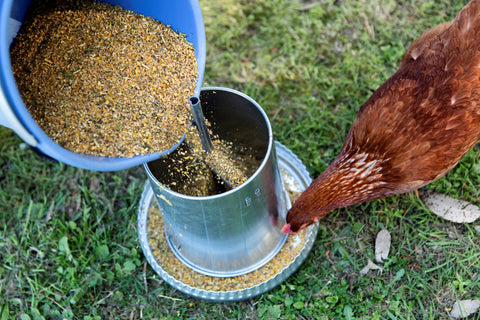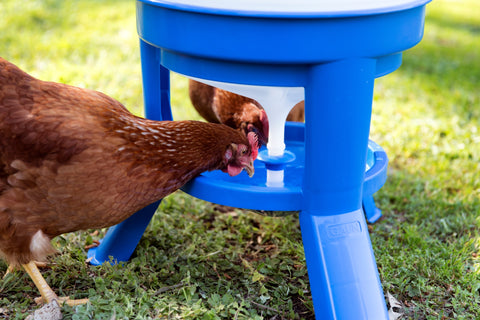Owning a backyard flock is certainly a wonderful experience, filled with fresh eggs, entertainment and fun. Hens are curious creatures that will reward you with both nutrition and friendship if well looked after. However, like any highly productive animal, the well-being of your chickens hinges on a crucial element - a balanced diet.
The Importance of Chicken Feed
Forget grains and haphazard mixes of scraps, shell grit, weeds, bugs and vegetables, a balanced chicken feed is the absolute orchestrator of your flock's health. It influences everything from their vibrant plumage to their egg production. It's more than just sustenance or something to "fill them up", it's the foundation for a thriving, happy flock.
Why Balanced Chicken Feed Matters
Chicks and young hens not yet laying eggs (pullets), need specialised nutrients to build strong bones along with developing their feathers/plumage and digestive systems. A balanced diet strengthens your hens' natural defences, keeping them resilient against common poultry ailments due to their robust immune systems. Without the right diet during their development, they will never reach their full potential, much the same as us humans.
Craving those flavoursome cheese omelettes or my favourite, poached eggs on toast? A balanced chicken feed also fuels your hens' reproductive system, ensuring a consistent and sustained flow of delicious eggs.
Feather Condition
Healthy plumage with shiny feathers is more than just aesthetics as they're indicators of good health. Balanced feed provides the nutrients for these vital structures to remain strong and thrive.
Digestive System Health
A healthy gut means a happy hen! Balanced feed promotes proper digestion and nutrient absorption. A well-developed gizzard for a chick and pullet means that as a hen, she is far better able to extract nutrients from her food. This leads to less output in the form of manure as the hen can utilise more of the nutrition in the chicken feed.
The Chicken Feed Fallacy
Not all chicken feed is created equal with many formulated with low-cost in mind in a “race to the bottom”. This is often due to the outdated notion that chickens eat “anything” and still lay eggs consistently.
This fallacy is proven time and time again as the best-laying hens such as the ISA and Hy-Line Browns, struggle to lay eggs to their potential. The best egg-laying breeds have been carefully bred for up to 100 years and their diets carefully researched and formulated for maintaining peak health and laying performance. Most other breeds of hen (typically purebreds), lay sporadically throughout the year with no eggs laid while they are broody or going through their annual moults.
Decoding Chicken Feed Ingredients
A complete and balanced chicken feed is a very carefully crafted composition of essential elements. It is devised specifically for the age and developmental stage of a chicken so the right feed for the right stage is essential.
- Grains: Wheat, corn, lucerne and barley form the energy backbone
- Protein: Soybeans, fishmeal and meat meal (in cheaper, non-vegetarian diets), offer essential amino acids for building strong muscles and maintaining healthy plumage and egg size.
- Essential Fats and Oils: Flaxseed and canola oil supply vital fatty acids which help with the absorption of nutrients and increase the palatability of the feed
- Vitamins, Minerals and Trace Elements: A premix ensures your hens receive a balanced spectrum of vital nutrients, from methionine and arginine for optimal bone health to vitamin D for robust egg production.
- Grit: Shell grit and limestone grit enable food to be ground-up in the chicken’s gizzard which acts as a grinding machine. It also provides the calcium needed for sturdy bones and strong egg shells.
Choosing the Right Chicken Feed
Navigating the world of chicken feed can feel like deciphering hieroglyphics at times. Here are some tips to ensure your chickens get the best fuel:
- Pay close attention to the feed's age. Most chicken feed slowly loses its nutritional value over time so make sure that it is as fresh as possible and use it within 6 months. Store your feed in a rodent-proof, airtight container in a cool, dry location.
- Knowing the age of your flock, confirm that you are selecting the correct feed which should be Chick Starter (hatch day to 4 weeks of age), Grower (5 to 14 weeks) and Layer feed (15+ weeks).
- Be species-specific so no duck, budgie or wild bird feed for your chickens.
- Get expert advice from specialists in chickens AND egg laying. A good Vet who sees or deals with a lot of chickens (uncommon), a poultry expert such as Megg Miller (Australasian Poultry Magazine Editor), or someone who has both egg farming and backyard chicken expertise such as… um… Talking Hens! Pet shop and grain supplies retailers sell a wide range of feeds for multiple species of animal and are unlikely to have expertise in any single one beyond what they’ve been told.
- Ask questions and get sensible, logical answers that give you confidence. We have had customers visit with nondescript bags of expired muesli sold as a balanced chicken feed that I found tasty enough but no good for hens!
- Quality counts so invest in the highest-quality feed you can afford. Remember, you're nurturing your hens' well-being and happiness not to mention their health and egg quality!
Chicken Feed for a Happy, Healthy Flock
By providing your chickens with a balanced, high-quality diet that has been tailored to their needs, you're not just filling their bellies, you're investing in their long-term health and happiness. A laying hen is one of the exceedingly rare household pets that help “pay the rent”. So, ditch the generic grains and scraps and embrace the “symphony of nutrients” that a balanced chicken feed such as our Sustainable Layer provides. Your hens, and your breakfast table, will thank you for it!







Comments (1)
My hens enjoy their sustainable layer food. Seems to be a good mix of ingredients, including shell grit and minerals. Have tried other feed, but this is the best for my bantams.